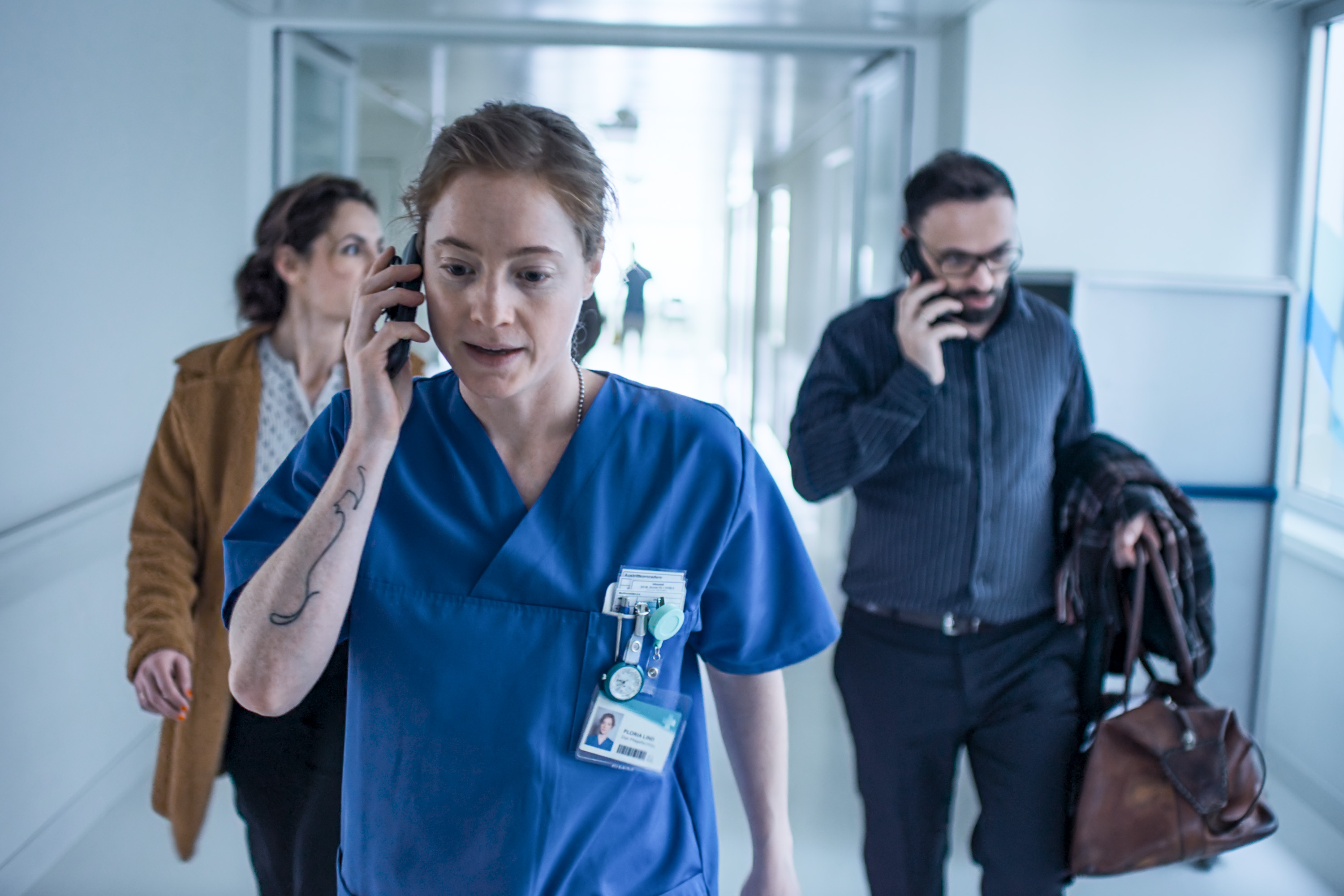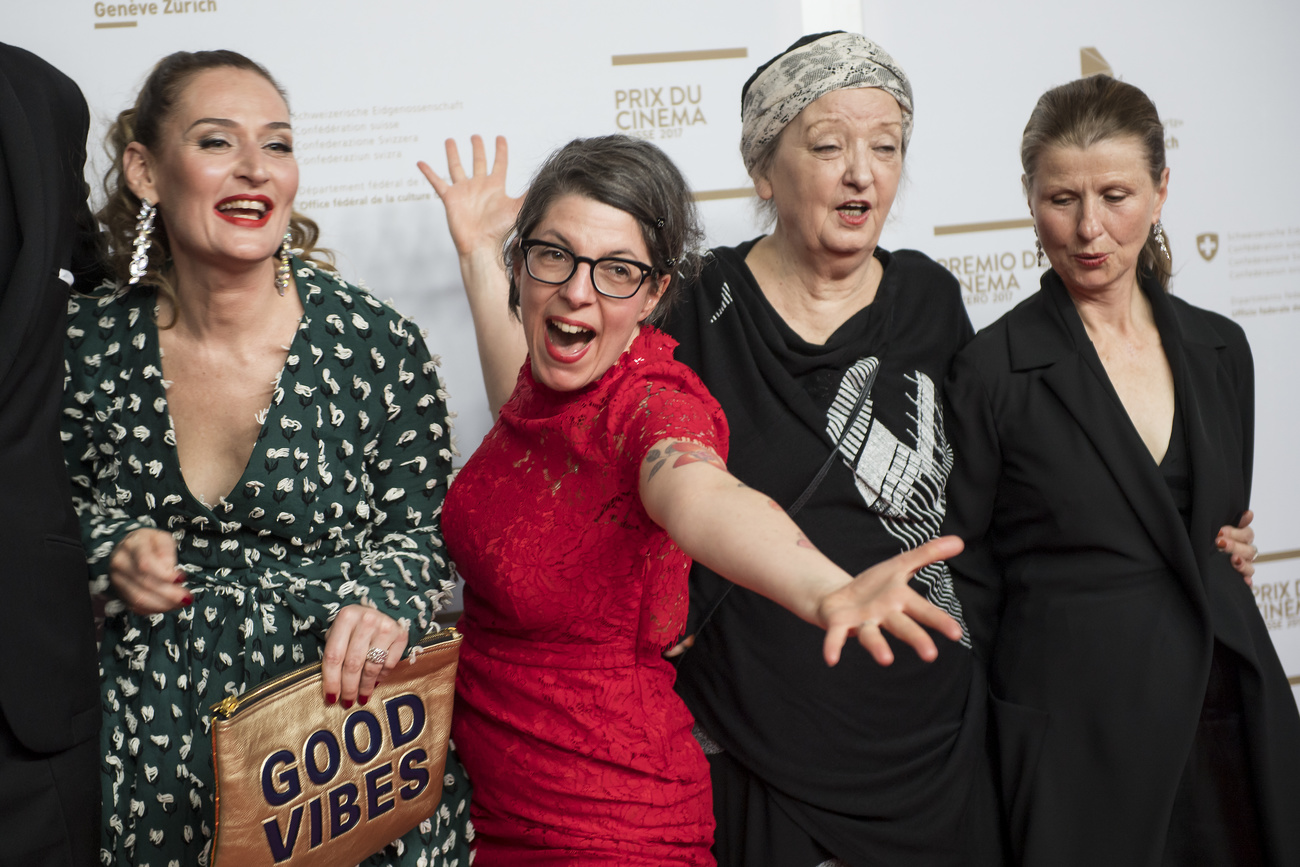
Berlin Film Festival: the heroic ‘Late Shift’ of a Swiss nurse

Swiss filmmaker Petra Volpe's fast-paced hospital drama had its Berlin Film Festival premiere last week. In an interview with SWI swissinfo, she talks about heroism, and how she frames it in her films.
A female nurse confidently strides through the corridors of a hospital ward at night. During her hectic night shift, she has to attend to patients of all kinds: confused elderly people, wealthy men in private wards who impatiently bark orders, anxious immigrants without immediate family present, and dying men and women facing their last moments.
This incredible flurry of activity is portrayed in bravura fashion in Petra Volpe’s Late Shift (2025), with German actress Leonie Benesch in the lead role as the nurse, Floria. In this taut, well-observed new film, the common thread is Floria’s professionalism in the face of what amounts to a barrage of demands and requirements that is impossible to manage.
“I used to live with a nurse, which had a way of making what I was doing seem banal,” the director told SWI swissinfo.ch from Berlin where the film had its world premiere in the Berlinale Special section from February 17.
“In those days, my partner would tell me about the exact amount of time it takes to wash an elderly person or change their diaper. It was clear that it is not possible, in fact, to measure the time it takes to do this kind of work and that one act of care will require all kinds of other interactions within it that defy strict measurement: conversation, soothing, calming,” she adds.
Indeed, in one of Late Shift’s most touching moments, we see a nurse calming down an elderly patient who is panicked and confused after receiving a call from a daughter whose voice she doesn’t recognise. When spoken assurances fail, the nurse begins to sing, and her patient, catching the melody, joins in. For reasons that are not entirely rational, this brings tranquillity to their interactions. It is a connection beyond words.
“For me the heroism of the job is precisely that she sits down and sings, even though she doesn’t have time,” Volpe says. “By doing that, she knows it will derail her shift even more. And for me, the definition of heroism is people who stay kind and caring despite the pressure they’re under.”

A director with a message
Volpe is best known for her feature The Divine Order (2017), a box office hit about the Swiss suffragette movement’s fight for women’s right to vote in 1971, as well as for the film Traumland (2018) and the TV series Frieden (2020).
In her films, the Swiss director has long been unafraid to tackle important social issues head-on, viewing cinema as a social force. Despite her early exposure to the nursing profession, it took Volpe years to finally decide to make a film about it. This nebulous set of ideas only became a film when she encountered the non-fiction book, Our Profession Is Not the Problem – It’s the Circumstances by German nurse Madeline Calvelage, who would later serve as consultant on the film.
“After I read Madeline’s book, which got my blood racing as if it was a thriller, I realised the film should take place over the course of a single shift. Then I kept reading other books. I joined nurses on their shifts, I observed them, spoke with them about their issues, tried to understand what they feel every day and what additional support they need,” she explains.
Taking the viewer onto the ward
“In one way, [the film itself] could be a play – with a lot of rooms,” says Volpe, excitedly, when the idea of Late Shift’s inherent theatricality came up. The day has been busy with interviews, and our conversation follows shorter, more intense bursts of discussion with the clusters of journalists attending the festival. Her film has received a warm reception in Berlin, and Volpe seems in her element discussing the film’s particularities.
To create the ward in the film, her team shot on two abandoned floors of a hospital in Kilchberg, on the edge of Lake Zurich. “Everything there had been emptied out and sent to Ukraine. And they were even talking about tearing the whole place down, which our consultant Madeline, who was a nurse in Germany, where conditions are not as nice as there, was horrified to hear. As you can see, the hospital is in perfect condition,” says Volpe.
Making use of the hospital allowed them to transform it into an intensely theatrical space, dominated by Floria’s incessant movements from room to room. “We were free to do what we wanted. We were free to paint the floor white, for example, so that it resembled an ice rink,” explains the director. “We therefore saw Floria as an athlete, as a high-speed skater in a way. We do this kind of work to make it visually appealing also, since of course this is a film intended for cinemas.”

Night shift as performance
Like a theatrical performance, the work of this hospital night shift is a delicate balancing act. Any one small thing that goes awry can upend the whole production. Thanks to Volpe’s long flowing takes that carry us from one interaction to another, we sense intuitively that a single mishap on Floria’s part – a mistake or even an unintended slip – will compound each problem she encounters, and quickly the whole rhythm of her shift will be upended with disastrous results.
The sheer range of tasks the nurse has to undertake in the film echoes Volpe’s admiration for the profession. Part of our pleasure as an audience is in seeing those acts carried out with precision.
“Nurses have to be such professionals, especially today. Besides the requirements of care, they also need considerable technical knowledge of computers and medicine,” she notes. “It’s a highly complex craft, and then on top of that there’s the human aspect. They come into a room and find the whole world there. Relatives, friends, life and death. Some people need to be guided through their worries, to be reassured, to be made to laugh. Everybody’s different.”

Embodying a Swiss nurse
At the centre of the film is Leonie Benesch’s commanding, unpretentious performance as Floria. Both Volpe and Benesch understand that we don’t need excessive pathos; the strength of the material will speak for itself if they both show restraint. “[Leonie and I] approached the material in a very non-psychological way. We agreed that she’s not a victim, she loves her job, she has energy. She is an athlete. That was our starting point,” she says.
“Many of the nurses I spoke with are like that,” she continues, drawing again on her real-world research. “They love work, and their work. They love moving and solving challenges. They love a bit of pressure. And yet there’s a clear breaking point, and that’s become more and more the norm [in our society]. So that’s how we approached her: always in motion.”
As previously mentioned, the film, which is otherwise unadorned with contextual information, ends with a title card that details the dire situation for the profession in Switzerland and around the world, highlighting the startling statistic that, by 2030, there is expected to be a shortage of 13 million nurses worldwide.
Given the film’s warm reception in Berlin, Volpe is convinced that in Switzerland it should help underscore the important issues it raises.
“This movie is a declaration of love on my part [for the profession]; I simply want nurses to feel seen and appreciated. But of course, I also want to provoke. We need to discuss publicly how we can improve this dire situation. It’s in all our interests to do so. After all, we’re all potential patients,” she says.
Edited by Virginie Mangin & Eduardo Simantob/sb

More
Swiss women’s ‘absurd’ struggle hits the big screen

In compliance with the JTI standards
More: SWI swissinfo.ch certified by the Journalism Trust Initiative






























You can find an overview of ongoing debates with our journalists here . Please join us!
If you want to start a conversation about a topic raised in this article or want to report factual errors, email us at english@swissinfo.ch.